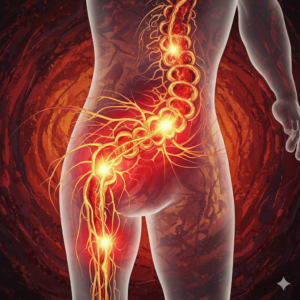Unveiling the Gut-Brain Barrier: The Key to Optimal Health
In the intricate ecosystem of our bodies, there exists a remarkable defense mechanism known as the gut-brain barrier (GBB). This impermeable fortress, nestled within our digestive system, plays a pivotal role in safeguarding our overall well-being. In this article, we’ll delve into the significance of the GBB, explore the vital connection between the vagus nerve and gut health, and unravel the implications of a compromised barrier, commonly referred to as “leaky gut.”
Understanding the Gut-Brain Barrier (GBB)
Imagine the GBB as a sturdy gatekeeper, meticulously regulating the flow of substances between the gut and the bloodstream. Composed of a complex network of cells, including epithelial cells and specialized immune cells, this barrier acts as a selective filter, allowing essential nutrients to pass through while blocking harmful toxins and pathogens.
The Vagus Nerve: Bridging the Gap
Enter the vagus nerve, a long wandering nerve that serves as the primary communication pathway between the gut and the brain. This neural superhighway facilitates bidirectional communication, enabling the gut to relay vital information to the brain and vice versa. From influencing mood and appetite to regulating immune function, the vagus nerve plays a central role in maintaining homeostasis throughout the body.
Leaky Gut Syndrome: Breaking Down the Barrier
However, when the integrity of the GBB is compromised, a condition known as leaky gut syndrome ensues. In this state, the once-impermeable barrier becomes permeable, allowing toxins, bacteria, and undigested food particles to leak into the bloodstream. This breach triggers a cascade of inflammatory responses, wreaking havoc on our health and well-being.
The Impact on Health
The repercussions of a compromised GBB extend far beyond the realm of digestion. Research suggests that leaky gut syndrome may contribute to a myriad of health issues, including autoimmune disorders, allergies, mood disorders, and even neurological conditions such as Alzheimer’s disease and Parkinson’s disease. Furthermore, disruptions in gut-brain communication have been linked to anxiety, depression, and cognitive decline.
Nurturing a Healthy Gut-Brain Axis
Fortunately, there are steps we can take to support the integrity of our gut-brain barrier and promote optimal health. Adopting a diet rich in whole foods, fiber, and probiotics can help nourish beneficial gut bacteria and fortify the GBB. Additionally, managing stress, getting adequate sleep, and incorporating mind-body practices such as meditation and yoga can help modulate the activity of the vagus nerve and promote gut-brain harmony.
In conclusion, the gut-brain barrier serves as a crucial linchpin in maintaining overall health and well-being. By understanding the intricate interplay between the gut, the brain, and the vagus nerve, we can empower ourselves to make informed choices that nurture our bodies from the inside out. Let us prioritize the health of our gut-brain axis, for it is truly the foundation upon which our vitality and resilience thrive.










